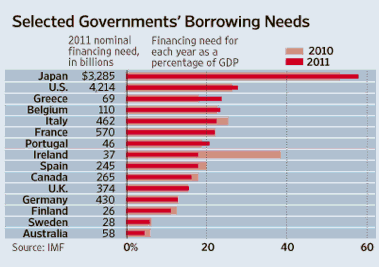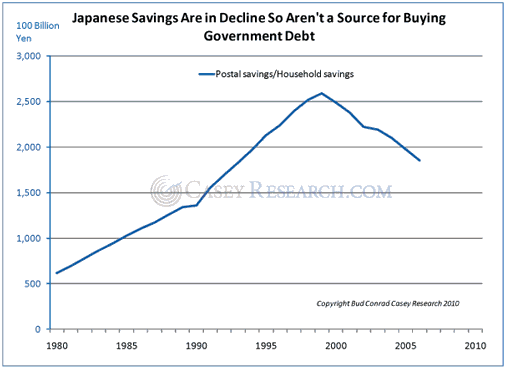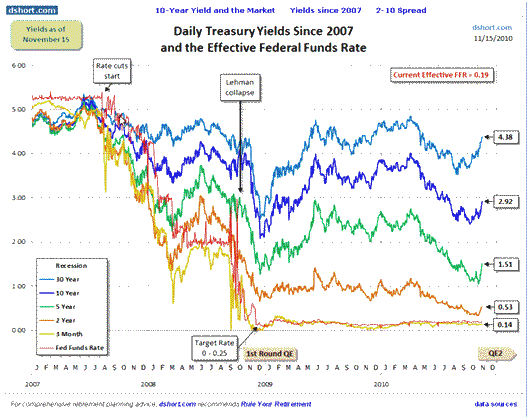Japan Collection Call on U.S. Debtors
Interest-Rates / US Debt Dec 08, 2010 - 03:52 AM GMTBy: David_Galland
 Hello, is this Japan I'm speaking to?
Hello, is this Japan I'm speaking to?
Yes. (tentative). May I ask who's calling?
It's the ACME collection agency. We're calling today because of your outstanding obligations.
Is there a problem?
We're hoping not, but your creditors are beginning to worry you won't be able to keep up with your debt service.
Oh. Why the sudden concern?
It was an item in a recent RMB Currency Trader. And I quote:

The Land of the Rising Sun has the dubious distinction of sporting the highest debt-to-GDP ratio of any industrialized nation in the world. Now greater than 200%, Japan's relative debt load is bigger than that of Greece, Spain, Portugal or the US. Japan needs to borrow over 50% of GDP this year just to stay afloat, according to the International Monetary Fund (IMF), and its financing needs are expected to reach almost 60% of GDP next year. (See graph below.) Its strength has been somewhat befuddling, especially considering this growing burden of debt.
Why has the Japanese currency been so strong? Because despite all of the yen's problems, Japan runs a trade surplus. Traders view that surplus as a source of funding which can be used to pay down Japan's skyrocketing debt, making the yen seem like a "flight-to-quality" currency despite appearances. However, Japan's strong currency is beginning to affect Japan's ability to export. Competition from China and rising Asian powers such as Vietnam is also beginning to take its toll. Japanese industrial output fell 1.9% in September after dropping 1% in August.
Care to comment, Japan? Japan? Are you there? Hello? Hello?
David again. As you can see from the chart, even though Japan has managed to stay off the radar of the mainstream financial media, the country's economy is in a real mess. And, for the record, the U.S. is in no great shakes, either, not when you consider the neighborhood it's in, in the above chart.
As we have discussed at length in The Casey Report, while the eurozone is back in the soup just now, Japan could very well be the next black swan to lay an egg on the global economy.
Heretofore, Japan has been able to avoid the worst consequences of its many debts and obligations - but that may soon change. In addition to the exports referenced above, the country's high internal savings rates have provided crucial support for the Japanese government's energetic issuance of debt at low rates. But as you can see in the chart below from our own Bud Conrad, those internal savings - like exports - are now in decline.

The upshot of this is that the Japanese government will increasingly have to turn to external buyers to finance its many obligations. That, in turn, will require competing with sovereign debt offering better yields.
Japan's extreme borrowing needs over the next couple of years are, at this point, locked in - which almost certainly means that Japanese interest rates will rise - potentially by a lot - relative to the near zero yields now on offer.
Yet it should be obvious from the IMF data that Japan simply can't afford to have the cost of servicing its massive debt rise even a little, let alone a lot. Which is another way of saying that something has to break, and soon.
Another way to view the situation is by looking at the trend for yields being offered by Japan's largest competitor for new borrowings, the U.S. As you can see in chart here - which ran in today's edition of Things That Make You Go Hmmm - yields are clearly moving up.

It all begins to get a bit circular when you consider that Japan's aggressive financing needs make it likely the country will have to dial back its participation in future auctions of U.S. Treasuries. It would not surprise me if they followed China's lead in reducing the U.S. paper now held in reserve. That, in turn, could lead to even higher U.S. rates, and even higher rates for Japan. Or it could lead to more monetization of U.S. Treasury debt by the Fed, which in turn leads to Mr. Market demanding higher yields to compensate for the rising potential of inflation.
This Gordian Knot of the interconnected global financial system makes it essential for investors to not only monitor your own house for signs of fire, but to watch your neighbor's as well. In the case of Japan, smoke is starting to leak out from under the door.
To figure out the correct moves for your investment portfolio, it is not enough to focus on the domestic economy. In today’s interlinked global economy, the troubles of one country can spread like wildfire to others. Every month, The Casey Report analyzes big-picture trends to glean the best profit opportunities for subscribers. Try it for 3 full months, with money-back guarantee.
© 2010 Copyright Casey Research - All Rights Reserved
Disclaimer: The above is a matter of opinion provided for general information purposes only and is not intended as investment advice. Information and analysis above are derived from sources and utilising methods believed to be reliable, but we cannot accept responsibility for any losses you may incur as a result of this analysis. Individuals should consult with their personal financial advisors.
© 2005-2022 http://www.MarketOracle.co.uk - The Market Oracle is a FREE Daily Financial Markets Analysis & Forecasting online publication.



